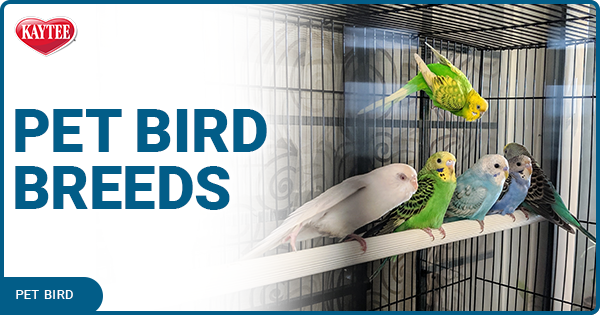The Best Types of Homes for Different Species of Pet Birds
You and your feathered friend have a lot in common. You’re fun, colorful, and love to spend time with people. Another thing you have in common is your space, so you’ll need to make sure that your home (in addition your bird’s habitat) is safe and comfortable.
Here are tips and considerations for making sure your home is right for your pet bird:
Home Type
- Apartments and Condos Parakeets and budgies are little birds that don't require as much space as the big guys, and don't make a ton of noise. Please note that these apartment birdies will need a habitat that’s longer than it is high so they have space to hop and fly. Other bird species that are suited to apartment living include finches, canaries, and parrotlets.
- Single-Family Homes Larger birds like cockatiels and parrots will need room for a larger cage. They’ll also make louder calls and chirps that necessitate a private space, such as a single-family home that doesn’t have neighbors immediately nearby.
- Older Homes Many sources suggest that pet birds should be kept away from older paint on trim around windows and doors that may contain lead paint.
Room Features to Note
- Ceiling Fans Even when turned off, ceiling fans present a hazard to our feathered friends. When your bird has out-of-habitat time, keep them away from fan blades!
- New Carpeting New carpeting may hold hidden dangers for birds—carpeting will often give off fumes that are deadly to pet birds. Air quality is critical to your pet’s health, as noted below.
Temperature and Humidity
Consider where your bird is from originally when setting the temperature for your shared home. (They’re parrots, not penguins!) This means keeping your space at a minimum of 65 degrees Fahrenheit.
Humidity is an important consideration, as dry air can contribute to dry skin, brittle, breakable feathers, and other ailments. Try an electronic humidifier or a misting schedule to hover around 40-50% humidity and keep your downy dude (or dudette!) comfy.
Air Quality
- Smoke If it’s bad for you, it’s bad for your bird. Because our avian allies have super-sensitive respiratory systems, they pick up on every household and environmental pollutant they encounter. That means no indoor smoke if you own a bird.
- Cooking Fumes and Other Pollutants Whether you’re frying catfish or painting an old dresser, strong fumes and smells are dangerous to your bird friend. Keep cooking fumes, volatile cleaning products, paint, varnish, and fireplace fumes far away from your bird.
- Air Filters Birds love clean, fresh air as much as humans do, so make sure to change your air filters every 45 days, or according to the manufacturer’s instructions.
Noise
Your bird loves you, and likely loves your day-to-day noise. That’s probably why most birds are excited by household hubbub like talking, singing, or the sound of a vacuum running. However, they are sensitive to overly loud noises from TVs, stereos, construction, or noisy kids. Keep their noise exposure at a reasonable level, and make sure it’s only during their waking hours. A bird’s gotta sleep, too!

With these tips on hand (on feather, really) you’re equipped to be an expert bird owner and to provide them with a comfortable, safe forever home.
If you’re ready to make your bird’s enclosure perfect, fly on over to our cages and playstands . Or, if you need help picking an enclosure, check out this blog for 5 ways to make sure your bird’s housing and environment is just right.
Like us on Facebook for more pet tips!
Sources:
https://www.thesprucepets.com/best-birds-for-apartment-living-390810
https://www.thesprucepets.com/cold-weather-bird-care-390724










.png?h=315&iar=0&w=600&hash=D97DB36D5E3F21371C65308B485A4F28)


